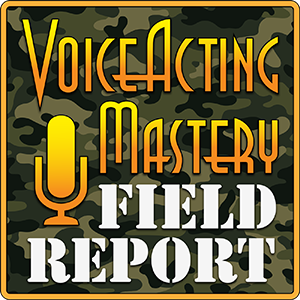VAM 113 | Do You Need to Be a Vocal Chameleon to Succeed as a Voice Actor?
Welcome to episode 113 of the Voice Acting Mastery podcast with yours truly, Crispin Freeman!
As always, you can listen to the podcast using the player above, or download the mp3 using the link at the bottom of this blog post. The podcast is also available via the iTunes Store online. Just follow this link to view the podcast in iTunes:
http://www.voiceactingmastery.com/podcast
In this episode, I want to address a common misconception about voice acting, one that often causes a lot of anxiety and self-doubt in new and aspiring voice actors. There’s a widespread belief that in order to truly be successful as a voice actor, you need to be able to perform dozens if not hundreds of different voices. A common question I hear from first-timers is, “How do I learn to change my voice more?” or “How do I expand my range of characters?” Everyone seems to want to play a large number of radically different-sounding characters, and it’s seen as a particular badge of honor if “no one can recognize that it’s you” playing those characters. On one hand it’s easy to understand why it might seem really important to be this kind of vocal chameleon. After all, you hear about it a lot. Often the voice actors that get the most media acclaim are those who have the ability to change the sound of their voice so radically that it is hard to tell it’s the same person playing different characters. Mel Blanc is the most obvious example of this. Mel was the voice of almost every male character in the classic Looney Toons, including Bugs Bunny, Daffy Duck, Yosemite Sam and many others. In more recent years, actors like Frank Welker, Billy West and Jim Cummings are often heralded for their ability to be vocal chameleons and to differentiate the sound of their characters drastically.
When faced with such impressive examples of vocal transformation, many beginning voice actors believe that the most important skill they must develop is the ability to modify the sound of their voice. They feel that they must be the voice actor of a hundred or a thousand voices and they worry that if they can’t achieve that vocal flexibility, that they’ll never be professionally competitive in the industry. This can lead to them spending the majority of their time trying to find techniques to change the sound of their voice, rather than focusing on the highest priority in voice acting: the acting.
While being able to change the sound of your voice is certainly a useful and marketable skill, being a vocal chameleon is not nearly as important as being a capable actor. It is far more important to have the emotional flexibility to identify with a wide range of character psychologies than it is to be able to disguise your natural speaking voice. Ideally, a consummate voice actor strives for both and can not only portray the nuances of a character’s psychology, but can also adjust their vocal instrument to sound appropriate as the character. But too often I see aspiring voice actors put all their focus on trying to change the sound of their voice, and not nearly enough attention on their ability to act well.
Another damaging aspect of believing that one needs to be a vocal chameleon is it can lead you to discount the greatest asset you have in your voice acting arsenal: your own natural voice. I’m going to spend this episode debunking the myth that you need to be a vocal chameleon, if only to free you from the creeping fear that your own voice is not enough. I’m also going to give you a way to approach vocal flexibility that is based on the emotional believability of your acting, rather then trying to use technical tricks to change what you sound like. The fact is, any vocal transformation that is not rooted in the psychology of a character will not sound believable anyway, so the more you focus on the acting, the more believable your vocal transformations will be. Let’s get started.
Download Voice Acting Mastery Episode #113 Here (MP3)
VAMFR 008 | Interview with Erika Harlacher, Part 2

VAMFR 008 | Interview with Erika Harlacher, Part 2
Welcome to episode 8 of the Voice Acting Mastery: Field Report podcast!
In this episode our correspondent, Tom Bauer, concludes his interview with the prolific and mult-talented Erika Harlacher.
Erika has been featured in a number of Anime titles, including roles such as Princess Asseylum Vers Allusia in Aldnoah.Zero and Sadira in Killer Instinct.
In the previous episode, Erika and Tom talked about how she got her start in voice acting and some of the struggles she had coping with her self-doubt. Erika has found that being patient with herself and developing a strong, emotional support system of friends and colleagues has helped give her the confidence she needs when performing in the booth.
In this episode, Tom and Erika discuss the importance of taking classes as well as practicing on your own in order to develop and expand your skill set as an actor. If you are pursuing a professional voice acting career, it is vitally important for you to have faith in your acting abilities, especially when you are called on to perform in the different realms of Voice Over such as Anime and Video games. Erika also talks about her plans for the future as well as giving some practical advice for those wanting to get into Voice Over. Let’s hear what she has to share!
The VAM Field Report will be released on the 1st Wednesday of every month so stay on the look out for it!
Download VAM Field Report Episode #8 Here (MP3)
